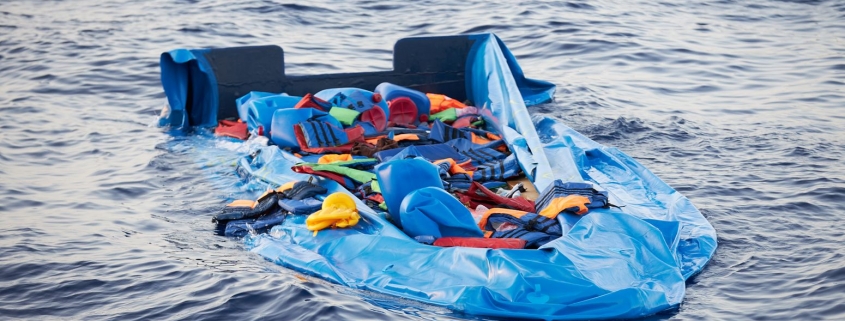Starved, parched and drowned in a european search and rescue zone
Malta ignored emergency distress calls for five days and seems to have used third parties to violate international law.
A refugee drama in the Mediterranean took place largely unnoticed by the public in early April. A fishing boat with Maltese registration took care of a boat in distress. Although the refugees were already in the Maltese search and rescue zone, they were brought back to Libya. That alone constitutes a violation of applicable international law. But there is reason to suspect that there is a system behind the procedure.
Dramatic scenes take place on the ALAN KURDI in early April. With 150 rescued, the Sea-Eye rescue ship is hopelessly overcrowded. No port allows entry. In the meantime, even the supply with food and medicine was refused. Sea rescue in times of the coronavirus. The pandemic closes Europe’s hearts and harbors.
At the same time, a rubber boat sets off from Garabulli, Libya, on April 9th. There are 63 people on board – including seven women and three children. Their goal: a port of safety. The next day, the boat is sighted in the Libyan search and rescue zone by an aircraft of the EU border-control agency Frontex.
An emergency distress call is made at night via the Alarmphone. The unseaworthy boat is taking in water, the lives of the refugees are in mortal danger. The position of the GPS data indicated that they were in international waters. Alarmphone contacted the Maltese, Italian and Libyan authorities, but no rescue mission was started.
In the morning of April 11, those responsible in Libya are finally reached. But because of the pandemic, no rescue missions are started here either. On Sunday, April 12th – Europe is celebrating the Christian Easter – the boat in distress arrived in the Maltese search and rescue zone according to GPS data. 24 hours later, both Italian and Maltese authorities launch air surveillance missions that confirm this. This information could become important in the future as it demonstrates that Malta is clearly responsible and this could be relevant for an investigation into the incident.
The Portuguese merchant ship IVAN, which is in the vicinity of the boat in distress, is instructed to wait on site and only intervene in an emergency.
Then events roll over. At the sight of the large ship, refugees jump off board and try to swim to reach the ship. Completely exhausted, three of them drown in the sea. The desperate are holding a baby in the air to show the surveillance aircraft how great their distress and despair are.
Just before sunrise help arrives in the form of a fishing boat. The MAE YEMANJA takes over the survivors, the IVAN is ordered to move away. Since Malta has closed its ports, the captain brings the refugees back to Libya. So far, so easy. But it is not.
The truth seems a lot more terrible. The MAE YEMANJA, which reaches the port of Tripoli on April 15 – six days after it left – with 56 people on board, is probably not merely a harmless fishing boat.
Five people were killed. Starved and parched to death. Seven people are still missing today. They all probably drowned.
According to Maltese blogger and investigative journalist Manuel Delia, the MAE YEMANJA left Malta’s large port on April 14 without a clear destination. After it had sailed off, the crew switched off the radar and only switched it on again the following day in Libya.
The fishing boat is registered in Malta, and the owner is Carmelo Grech, a well-known Maltese businessman with a dubious past. In a smuggling trial he was recently acquitted of all charges, despite incriminating evidence. In 2015, he was seized with 300,000 euros in cash in Libya, which led to a detailed investigation, which, however, miraculously fizzled out. Maltese investigative journalist Daphne Capuana Galizia, who was murdered by a car bomb on October 16, 2017, also researched Grech’s wide-ranging business interests.
Officially, it is said that Grech recently sold the MAE YEMANJA to a Libyan company. A corporation however, that can again be traced back to the Maltese entrepreneur. It is also claimed that the MAE YEMANJA was only dispatched to provide the refugees with water and food.
Unofficially, suspicion arises that Malta is sending small, private ships to bring refugees back to Libya so as to get rid of a problem – all against applicable law. Such dubious missions take people back to detention camps where ill-treatment, rape and torture are daily occurences.
It is still unclear whether the MAE YEMANJA ship owner has been paid by the state for his dubious rescue.
“It should send cold shivers down our spines in Germany when the Maltese Prime Minister Robert Abela comments on the death of up to 12 people with his ‘clear conscience’ and says that he acted in accordance with ‘national interest’,” says Gorden Isler, Chairman of Sea-Eye e. V.
“If the death of these people was in Malta’s interest, then we are no longer just talking about failure to render assistance resulting in loss of life. We find it worrying and disturbing that there is no criticism from Germany regarding Malta’s actions, ”continues Isler.
Criminal charges have been pressed against the Maltese government and Prime Minister Robert Abela. The judiciary has launched an investigation against him and army chief Jeffrey Curmi. In addition to this incident, there is also the allegation that the crew of a patrol boat destroyed the engine of a refugee boat and left the people to their fate.
(Martin Geiger)
Sources: Times of Malta, alarmphone.org, avvenire.it
Symbolic photo: Fabian Heinz / Sea-Eye (June 2019)


 © Cédric Fettouche & sea-eye.org
© Cédric Fettouche & sea-eye.org